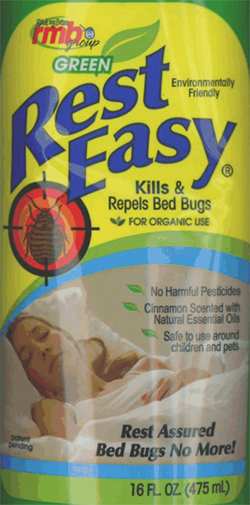The Federal Trade Commission filed deceptive advertising charges against two marketers of remedies for bed bug infestations, who allegedly failed to back up overhyped claims that they could prevent and eliminate infestations using natural ingredients, such as cinnamon and cedar oil. One marketer also allegedly made misleading claims that its products were effective against head lice.
In one of the two cases, RMB Group, LLC and its principals have agreed to settle the charges relating to their “Rest Easy” bed bug products. In the case  against Cedarcide Industries, Inc. and others, challenging their marketing of “Best Yet!” bed bug and head lice treatments, the defendants have not settled, and the FTC is beginning litigation against them.
against Cedarcide Industries, Inc. and others, challenging their marketing of “Best Yet!” bed bug and head lice treatments, the defendants have not settled, and the FTC is beginning litigation against them.
Bed bugs have been a growing public health pest in recent years, according to the Environmental Protection Agency. Consumers plagued with bed bugs experience considerable stress, discomfort, and expense in attempting to rid themselves of these pests, and many are unaware of the complex measures needed to prevent and control them, according to the EPA.
Consumers concerned about bed bugs also should see the FTC publication, “Good Night, Sleep Tight, and Don’t Let the Bed Bugs Bite . . . Your Wallet,” which urges caution about advertisements that offer quick solutions, and provides advice to consumers for treating bed bug infestations.
Also, as children head back to school this fall, the FTC urges parents to carefully research products that claim to treat head lice infestations.
In both cases, the FTC charged the marketing companies – as well as the individuals behind them – with deceptive advertising for claiming that their products can stop and prevent bed bug infestations. The Cedarcide defendants also are charged with making deceptive claims that their product can stop and prevent head lice infestations, and that the federal government endorses and is affiliated with their product.
The Cedarcide Industries, Inc. defendants market BEST Yet!, a line of cedar-oil-based liquid products they claim will treat and prevent bed bug and head lice infestations. The defendants sell the product to consumers nationwide. They also sell it to hotels and other commercial establishments for treating bed bugs, and to school districts for treating head lice. Consumers can buy the product online, by phone, at the Cedarcide website , and at Amazon.com. The cost of the products ranges from $29.95 for the quart-sized spray bottle to $3,394.95 for a hotel-motel bed bug eradication kit.
One radio advertisement for the product stated:
“In light of the recent bed bug media frenzy that has all of us nervous, you need to
know that bed bug prevention and eradication relief are available. So let’s not all freak out. All you need is Best Yet from CedarCide.com. . . . Best Yet was developed at the request of the USDA for our military, as a solution for killing sand fleas. But guess what, it’s equally deadly to bed bugs, larvae and eggs.”
The FTC complaint charges that the Cedarcide defendants make:
- unsupported claims that Best Yet!is effective at stopping and preventing bed bug infestations and that it is more effective than synthetic pesticides at doing so;
- false claims that scientific studies prove Best Yet!is effective at stopping and preventing bed bug infestations, and that it is more effective than synthetic pesticides at doing so;
- a false claim that the Environmental Protection Agency has warned consumers to avoid all synthetic pesticides for treating bed bug infestations;
- unsupported claims that Best Yet!is effective in stopping and preventing head lice infestations, killing head lice eggs, dissolving the glue that binds head lice eggs (known as nits) to hair, and killing head lice and their eggs in a single treatment; and
- false claims that scientific studies prove Best Yet! is effective in stopping and preventing head lice infestations.
- false claims that Best Yet!was invented for the U.S. Army at the request of the U.S. Department of Agriculture, and that the USDA has acknowledged the product as the number one choice of bio-based pesticides.
The Cedarcide complaint names Dave Glassel and several companies he controls: Springtech 77376, LLC; Cedarcide Industries, Inc.; Chemical Free Solutions, LLC; and Cedar Oil Technologies Corp.
RMB Group, LLC marketed Rest Easy, a liquid solution containing cinnamon, lemongrass, peppermint, and clove oils. The company sold it to retail chains Bed Bath & Beyond, Walgreens, and Big Lots, which in turn sold it to consumers primarily for use when staying in hotel rooms. The product was sold in a 16-ounce spray bottle, which cost $6.99 to $9.99, and a 2-ounce twin pack, which retailed for $5.99 to $7.77. It also was sold in a gallon jug for approximately $50.
A video ad appearing on a company-sponsored website stated:
“Did you Know … Bed bugs can survive up to 10 months without feeding. They can lay between 5 and 12 eggs per day … per bug! Why take a chance on being their next meal when you travel? Or having your business shut down because somebody unwittingly brought them in? Rest Easy … is a real GREEN All-Natural, Non-Pesticide, designed as a preventative for just these potential problems. Rest Easy And rest assured, bed bugs no more!”
The FTC complaint charges that the RMB Group defendants make unsupported claims that Rest Easy kills and repels bed bugs, and that a consumer can create a barrier against them by spraying the product around a bed.
Under the settlement, the defendants are barred from:
- representing that Rest Easy or any other pesticide kills or repels bed bugs or creates a barrier against them, and
- making any claims about the performance of such a product,
unless the representations are true and backed by competent and reliable scientific evidence.
The settlement imposes a $264,976 judgment against the Stuart, Florida-based RMB Group, LLC, and its owners, Howard and Bruce Brenner. The judgment is suspended because of the defendants’ inability to pay.
The Commission vote authorizing the staff to file the complaint against the RMB Group LLC defendants and approving the proposed consent decree was 4-1, with Commissioner J. Thomas Rosch voting no. The Commission vote authorizing the staff to file the complaint against the Cedarcide defendants was 5-0. The FTC filed both complaints and the proposed settlement order for the RMB defendants in the U.S. District Court for the Northern District of California on September 5, 2012. The proposed settlement order is subject to court approval.
NOTE: The Commission files a complaint when it has “reason to believe” that the law has been or is being violated and it appears to the Commission that a proceeding is in the public interest. The complaint is not a finding or ruling that the defendant has actually violated the law. The stipulated order is for settlement purposes only and does not constitute an admission by the defendant that the law has been violated. Stipulated orders have the force of law when approved and signed by the District Court judge.
The Federal Trade Commission works for consumers to prevent fraudulent, deceptive, and unfair business practices and to provide information to help spot, stop, and avoid them. To file a complaint in English or Spanish, visit the FTC’s online Complaint Assistant or call 1-877-FTC-HELP (1-877-382-4357). The FTC enters complaints into Consumer Sentinel, a secure, online database available to more than 2,000 civil and criminal law enforcement agencies in the U.S. and abroad. The FTC’s website provides free information on a variety of consumer topics. Like the FTC on Facebook, follow us on Twitter, and subscribe to press releases for the latest FTC news and resources.





 The Federal Trade Commission has published a guide to help mobile application developers observe truth-in-advertising and basic privacy principles when
The Federal Trade Commission has published a guide to help mobile application developers observe truth-in-advertising and basic privacy principles when